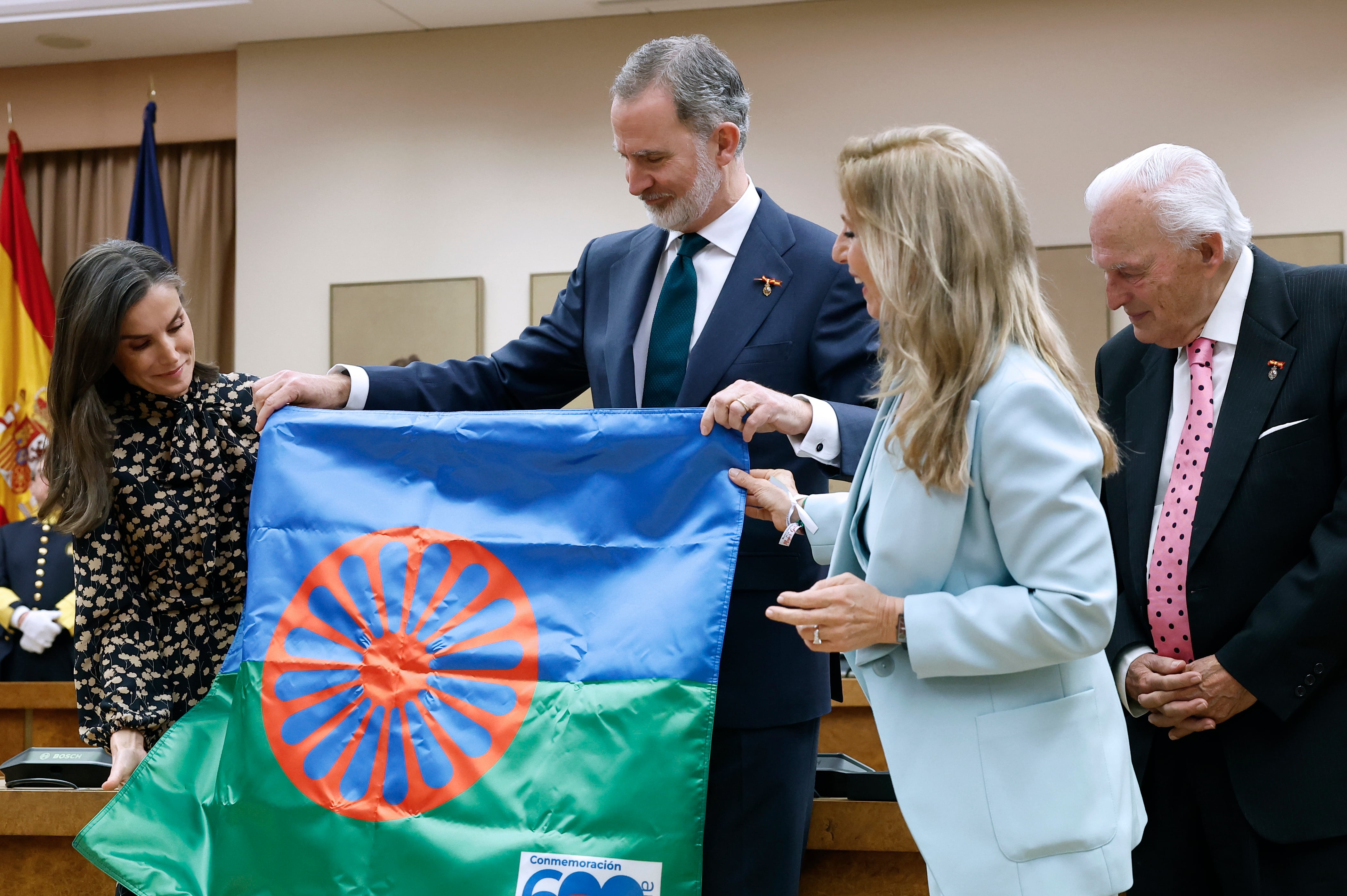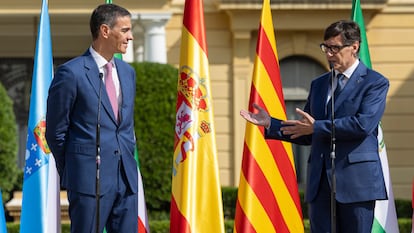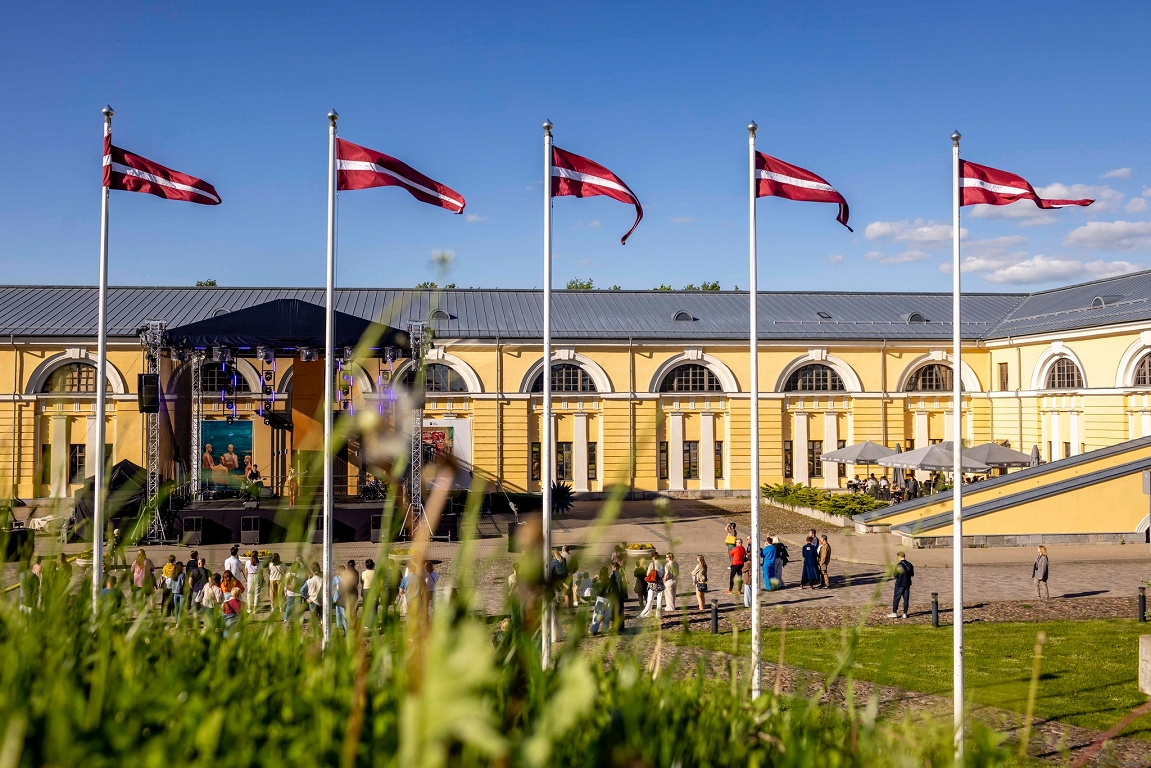The King, International Gypsy Day: « Discrimination is still present » | Spain

Sky blue, green field and a car wheel to represent the itinerance. It is the flag of Gypsy peoplea community that celebrated on Tuesday the 600 years of its arrival at the Iberian Peninsula after centuries of persecution since in the ninth century DC came out from India. In a solemn intervention, Felipe VI ―What next to the Queen has presided over the anniversary in the Constitutional Chamber of the Congress of Deputies – has acknowledged that, despite social advances to get this community out of the invisibility, « »Discrimination It is still present ”.
The president of Congress, Francina Armengol, who has received the Kings with the second vice president, Yolanda Díaz, ―The President, Pedro Sánchez, is on tour in Vietnam and China – and other members of the Government such as the Minister of Social Rights and Consumption, Pablo Bustinduy; the Minister of Inclusion, Social Security and Migrations, Elma Saiz; Minister of Equality, Ana Redondo; And the Minister of Youth and Childhood, Sira Rego, has recognized in her initial speech that « the Spanish State has a debt to the gypsy people. » After enumerating the social advances of this community during the last six centuries –Participation in institutional lifeEducation, culture, etc. – Armengol has wanted to launch a reflection to the couple of hundred personalities present in the room chaired by the portraits of the seven parents of the 1978 Constitution: « We must ask ourselves if this (discrimination) has ended, » he said in line with the words of Felipe VI.
This Tuesday has been an act to remember a centennial culture, with innumerable winks to the language, it was called the King’s speech, in the musicians who have interpreted the anthem Gelem Gelem (Anduve Anduve) -, but also with a clear message: end discrimination. « You have to take stock and continue fighting racism, xenophobia and any form of discrimination, » Armengol recalled, the third authority of the State. In fact, the parties were planned to approve an institutional declaration by the Gypsy people, a gesture that requires unanimity. At the moment, however, it has remained in the air because Vox, in the words of its spokesman, Pepa Millán, believes that it is a « too ideological » statement, Informs Xosé Hermida. In an exercise of a certain self -criticism, Bustinduy has recognized that « discrimination is a structural element of society » and ha I request, therefore, a « total effort » to end all types of marginalization and social exclusion.
In his brief words, the king has taken his eyes to remember that since his beginnings, the gypsy people have been marked by the « adversity » that has resulted over the years into discriminatory laws, persecutions, stigmatization and rejection. But despite the above, he continued, the gypsy people have demonstrated an « unwavering resistance, a continuous ability to adapt and overcome, making it an identity sign. » « The gypsy people have been and remain an active part in the construction of our society, leaving a deep mark on our identity. His contributions in art, culture and language, his solidarity spirit … Everything is part of our reality and our common legacy, which we value and proud, » the king has praised.
Carmen Santiago Reyes, second vice president of the State Council of the Gypsy People, has taken advantage of her intervention to highlight the deficiencies that she is currently feeling community that is already « indissoluble part of society » for its contribution, among other areas, to music, culture, arts, economy … « Today, and the days that follow, it is a day of claim because there is still discrimination, » said Santiago Reyes. And lists, above all, Education, in which they are still forming; and access to housing. Although access to a home is « very difficult also for the rest of the population, » he said, the gypsy people have more problems because their economy is lower. Today, this representative of the Gypsy people has asked the entire population to « a commitment to equality and inclusion » from their community to have a « full participation » in all aspects of social, cultural and economic life. « History shows us that recognition and inclusion strengthen societies. The full integration of the gypsy community is not only an advance for it, but it must be a reality in a more equitable and cohesive country, » the king recalled.
Felipe VI, who has closed the act that has lasted an hour, has been clear in his words and has said that « there is no place in society » for that discrimination. And that, paraphrasing the first gypsy deputy, Juan de Dios Ramírez Heredia – present in the spot – has baptized it as « discrimination of indifference. » That is, a form of silent, but deep exclusion. « The cruelest » because it normalizes rejection and condemnation of invisibility, said Felipe VI in front of gypsy representatives and personalities, such as Bailaor Joaquín Cortés.
It has been Ramírez Heredia himself, born 82 years ago in Puerto Real (Cádiz), and member of the PSOE, who has put a point of humor and emotion in the celebration. In a passionate speech that has started laughing among the public, this Cadiz has marked on April 8, 1971 as a turning point for its community. « Before, there was only a certain nebula, » he said in reference to the persecution of the gypsy people around the world. That year, and before the refusal of Paris, London agreed to host the first Congress of the Gypsy People who brought together gypsies from 28 countries. Only 26 years had passed since World War II ended and « many of the survivors (gypsies) of the Nazi extermination fields were still alive, » the deputy recalled. That congress gave them identity – the flag was created, a tongue was established -, in short, they began to get them out of the invisibility. And this Tuesday, Ramírez Heredia wanted to thank the presence of the head of the State on this anniversary: »You are the king of Spain, you are also the king of the gypsies. »







